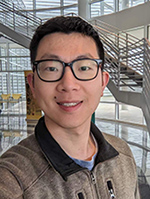A new type of solid-state qubit based on electrons on solid neon
Date: 2024/02/18 – 2024/02/18
Academic Seminar: A new type of solid-state qubit based on electrons on solid neon
Speaker: Xinhao Li, postdoc in the Nanoscience and Technology division of Argonne National Laboratory
Time: 9:00 a.m. February 18, 2024 (Beijing Time)
Link for the seminar: https://vc.feishu.cn/j/122621406
Abstract
Quantum science and technology hold the potential to profoundly impact our society by revolutionizing how we process, transfer, and analyze data. Central to this evolution is the pivotal role of engineering qubit-environmental interactions to facilitate accurate and scalable connections between quantum elements. Existing quantum architectures face challenges in this regard, such as decoherence channels like two-level systems within material substrates in circuit quantum electrodynamic (QED) architectures, posing a threat to data stability and system scalability. In this talk, I’ll showcase the utilization of thin solid neon film as a clean interface for single-electron qubits within quantum circuits. This breakthrough has enabled us to significantly enhance the lifetime, control preciseness, and scalability of electron charge qubits by minimizing the impact of environmental impurities. We achieve strong coupling between the trapped single-electron qubits and microwave photons in an on-chip superconducting resonator. The measured relaxation time T_1 and coherence time T_2 are both on the order of 0.1 milliseconds, supporting high-fidelity single-shot qubit readout (F_read=98.1%) and control (F_gate=99.97%). We further demonstrated the first step towards achieving two-qubit entanglement by coupling two electrons to the same resonator. Looking ahead, I envision building scalable and hybridized quantum devices via synergetic engineering of electron qubits and nano-mechanical/photonic interfaces for quantum information science and technology.
Biography
 Xinhao Li is a postdoc in the Nanoscience and Technology division of Argonne National Laboratory. He received his Ph.D. in Mechanical Engineering from the Massachusetts Institute of Technology, supervised by Prof. Nicholas Fang, and joined Argonne in 2021, working with Prof. Dafei Jin and Prof. David I. Schuster. His research interests include quantum and nano-electronics & photonics, superconducting circuits, and quantum liquids & solids. His current research focuses on developing mK quantum electronics with solid Neon for scalable and high-fidelity quantum information processing.
Xinhao Li is a postdoc in the Nanoscience and Technology division of Argonne National Laboratory. He received his Ph.D. in Mechanical Engineering from the Massachusetts Institute of Technology, supervised by Prof. Nicholas Fang, and joined Argonne in 2021, working with Prof. Dafei Jin and Prof. David I. Schuster. His research interests include quantum and nano-electronics & photonics, superconducting circuits, and quantum liquids & solids. His current research focuses on developing mK quantum electronics with solid Neon for scalable and high-fidelity quantum information processing.
